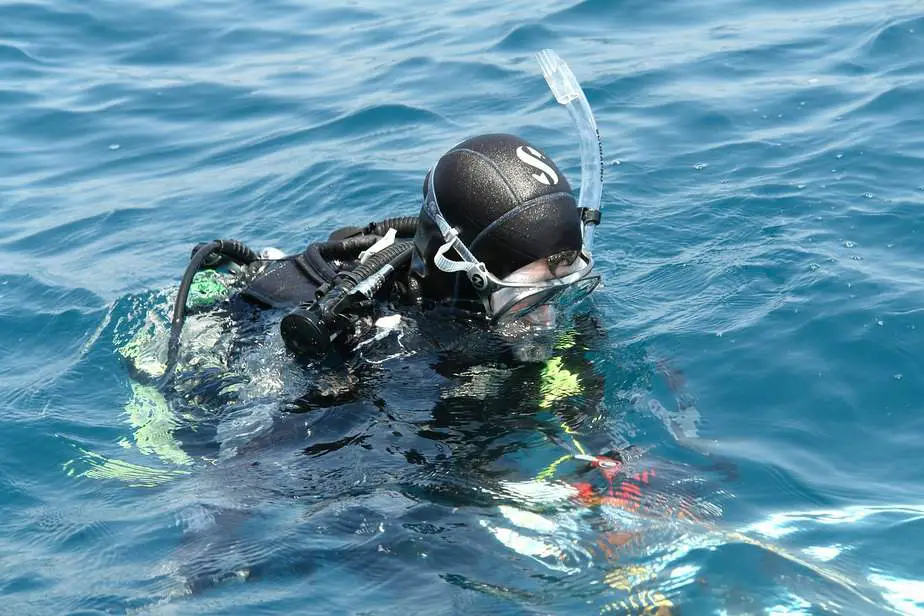Are you interested in visiting pristine tropical reefs, swimming with sea turtles, exploring the wrecks of sunken warships, or going scuba diving just for the sake of trying it out at least once in your life? But maybe you’re wondering if your swimming skills aren’t good enough, you’re too old, the scuba diving certification course might be too confusing, and so on. Essentially, you want to know if scuba diving is hard or difficult for most people.
In this article, we’ll show you that scuba diving isn’t hard as long as you are willing to commit some time and effort into this wonderful sport. You need to have the right mindset that you can do it. Even people with physical disabilities and medical conditions like asthma can qualify to be a scuba diver. There’s no reason why you can’t improve yourself to become a competent scuba diver as well. Let’s go over what you should expect.
Is scuba diving hard?
Like anything worth doing, there will be some effort and determination required to learn how to safely scuba dive. Exactly what issues you struggle with will vary from person to person. For instance, some people who aren’t good with studying textbooks may struggle with the academic theory behind scuba diving. Another student might struggle with performing a specific underwater skill properly.
Learning the theory and practical skills is difficult enough on its own. If you are generally anxious or uncomfortable in the water on top of that, it can feel impossible. One of the obstacles some people need to overcome has nothing to do with scuba diving, but rather their own fear of deep water. Some lucky people were perhaps a fish in another life and will find maneuvering in the water to be a simple and relaxing experience.
Whatever the case, students who have the drive, determination, and fire in their eyes so to speak, are the ones that will overcome all obstacles no matter how badly they start out. Fear of the water can be overcome through experience and practice. You just need to start small, which the Open Water course does as it guides you through progressively more difficult challenges until you’re ready to be certified.
In the next section, we’ll be going over the different parts of a scuba diving certification course. This will give you a heads up of what to expect, so you can do some preparation in advance (at least mentally), so you can be in the right mindset to succeed.
Is it hard to get scuba certified? What to expect.
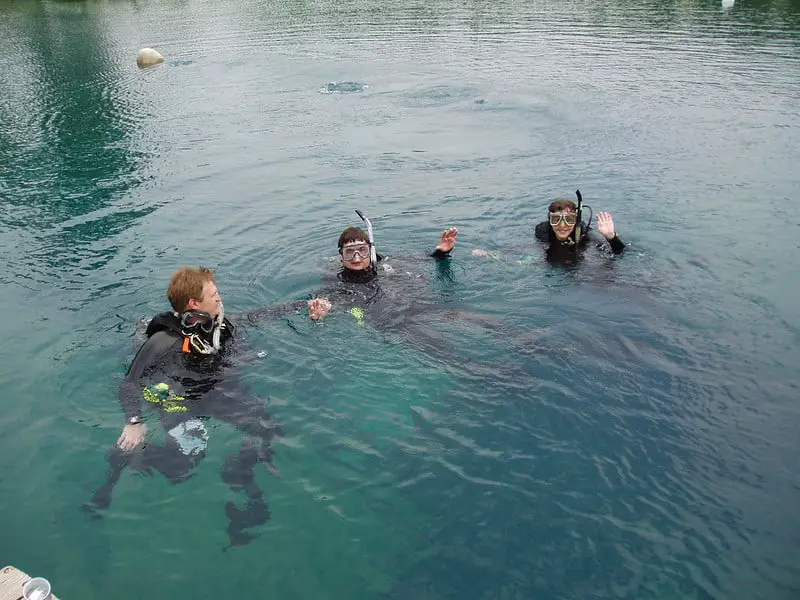
How do you even get started with diving? Well, if you plan on making scuba diving your hobby, you’ll need to get a scuba diving certification. Go to the official websites of the top scuba training agencies (e.g. PADI, NAUI, SSI) and sign up to their Open Water Diver course (or equivalent).
These agencies are world-renowned with locations all over the world. Their certifications are all recognized by dive shops and it basically doesn’t matter too much which agency you train with if you’re just starting out.
They may have slight differences in the order in which lessons are taught, but by the end of the course, you will have learned all of the same basics. Of course, if you want to discuss specifics, then ask your course instructor.
If you want to dive just once in your life and never again, there are many ways you can safely scuba dive without a license such as going on a guided tour or going SNUBA diving.
The standard Open Water Diver certification will teach you how to safely dive to a depth of 18 m (60 ft) with a dive buddy in water conditions similar to what you experienced in your training. Once you have successfully completed your course and attained your license, you never have to renew it because it doesn’t expire.
With that said, you may still wish to take a refresher course before a trip if you’re not feeling confident or you don’t have much experience with diving.
Diving theory
The first thing you’ll learn in a scuba diving course is basic diving theory. This is the basic knowledge you need to know before you even dip your toes in the water. It’s not particularly difficult; it’s designed so that even teenagers can pass this course.
These days, most agencies provide numerous options for the academy portion of their course, depending on the student’s preferences. Depending on how you learn, what you choose can make learning the theory a lot easier or harder on yourself.
You may be required to purchase a textbook, read online material, or to attend an in-person lecture in a classroom setting. You may also need to watch some instructional videos. Basically, think of this like going back to school. Some people prefer e-Learning because they don’t have time to attend a class and want to learn at their own pace. Some prefer going to a classroom because it helps them pay attention and they can ask questions.
Whatever option you prefer, the instructor or textbook will teach you the basics. Some instructors may even mix in practical elements with the theory based on their own experience. Attending a classroom lecture has the benefit of being able to ask the instructor to clarify a point or to adjust the way a topic is taught. If you are confused, don’t be afraid to ask a question!
During the academic portion of the scuba course, you will be quizzed along the way and the course will end with a final exam. Note that you can fail this exam and course, just as you could fail a college or university course. You do not get a free pass just due to participation, so pay attention and learn! Your life literally depends on it once you’re underwater.
Swim test
After you pass the academic portion of the course, you can finally move on to the practical portion. You will finally be heading to the water, but for now, it’s going to be in a confined body of water such as a swimming pool. The next test begins now.
First, you will be asked to pass a swim test. Depending on your fitness level, this may be easy or ridiculously difficult if you’re out of shape. You don’t need to be a strong swimmer to pass this test. There are two portions to the test: a float test, and a distance test.
The float test is just a test to see how comfortable you are in the water. You will be asked to keep your head above water for 10 minutes without any buoyancy aids.
The swimming test requires you to swim a distance of 200m / yards however you like with no time limits.
In terms of difficulty, as long as you have some swimming experience and occasionally exercise, you should have the endurance to easily pass the swim test. If not, well, here’s us giving you a heads up right now. Do some training so you don’t fail the swim test.
Confined diving
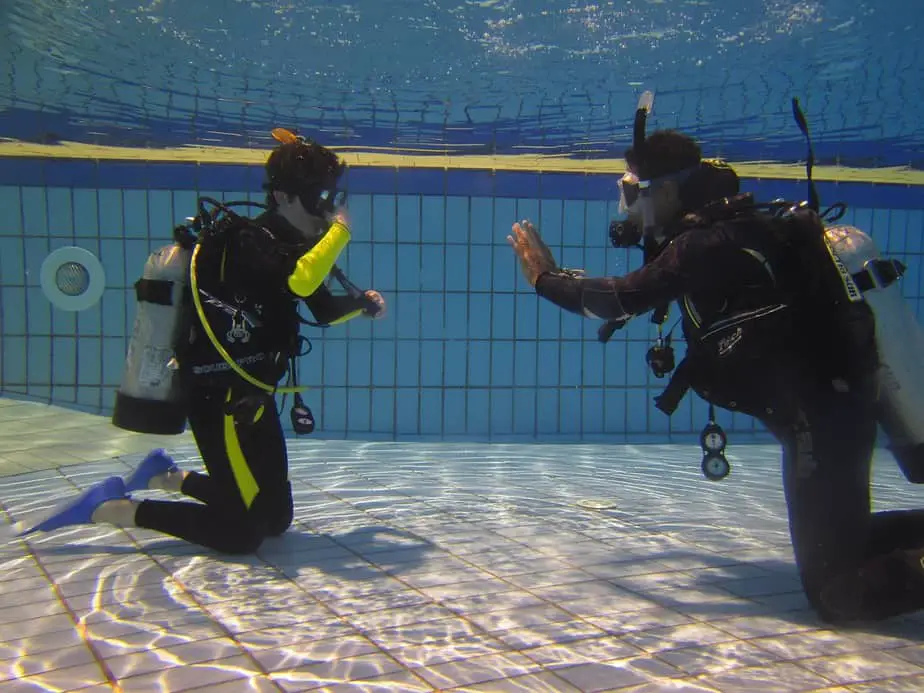
After passing the swim test, you finally get the opportunity to don scuba gear in a confined pool or sheltered area with no currents such as a lagoon. Sorry, but you’re not doing “real” scuba diving just yet. The point of pool diving is to introduce you to the scuba gear and how to use them.
The water will be shallow and completely calm so there aren’t going to be external factors affecting your learning. You start off in water that you can stand up in before progressing to deeper waters.
Your dive instructor will be with you the entire time watching over you and instructing you when needed. Your job is to get comfortable with all of the gear and apply the knowledge you learned from the diving theory portion of the course.
This portion of the scuba course is perhaps the “easiest” part, especially if you are a hands-on type of learner. Whatever you learn while pool diving will be put to the test really soon, so stay focused.
Open water diving
Finally, it’s time to put all of your skills and knowledge to the test by heading into open water and doing some proper scuba diving. You are now tasked with doing four (4) dives in open water. This is the real deal. You will be graded on your ability to follow the safety guidelines that you were taught in the lessons before.
If you’re feeling nervous, try to think of this as a fun opportunity to see aquatic life. Think of it like you’re on vacation; perhaps you really are on vacation and are taking your open water diver course abroad. Try to enjoy this wonderful diving experience, and at the end of four dives, you will be a certified diver.
Overall, this is the hardest section of the course. Nerves will probably be at an all time high because you may be diving deeper than you’ve ever done in your life. The key is to take things slowly, literally. Be slow on the descent, be slow on the ascent.
Some quick tips for you:
- Never hold your breath; breath continuously.
- Don’t ascend faster than the speed of a rising bubble.
- Always perform a safety stop, even on no-decompression dives to drastically decrease your chances of getting decompression sickness.
- Don’t dive deeper or longer than what you planned.
How to make it easier to pass the Open Water Diver course
Now that you know roughly what to expect from the open water course, you might be worried that some of the things you’ll be tested on might be too hard for you. Not to worry, there are some things you can do ahead of time to make things easier for you.
Find the right instructor
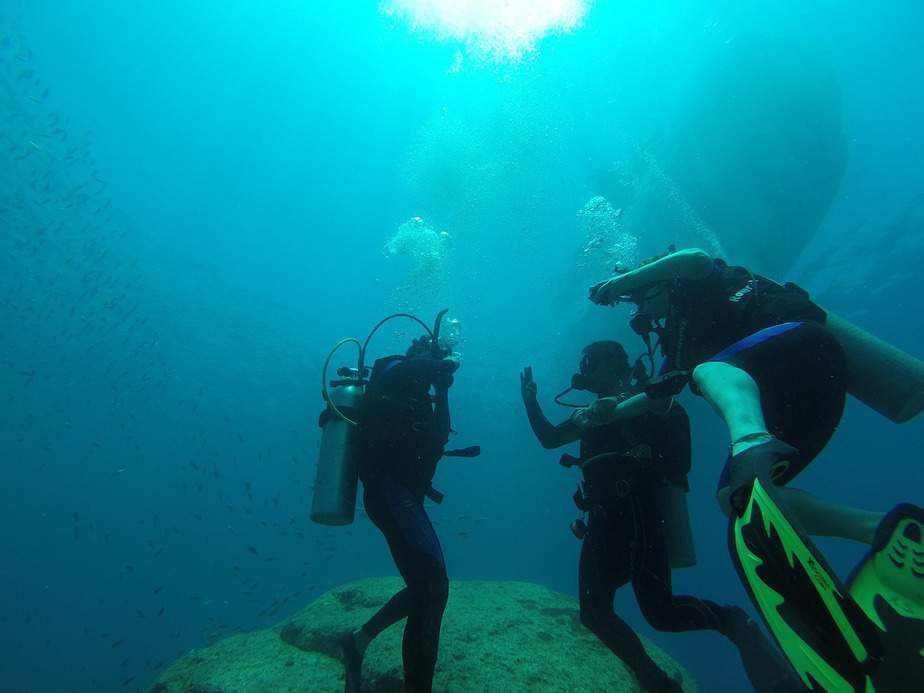
Don’t book your course at a dive center just because it’s the cheapest or closest. Convenience might seem good at first, but you’re taking a huge gamble. Instead, you should look like dive center reviews on sites like Yelp or Tripadvisor.
If you have scuba friends, ask them where they got certified. If they’re willing to go the extra mile, maybe they will even assist you with the research. You want to make sure that the instructors there are knowledgeable and personable. There’s nothing more demotivating than an uninterested or incompetent instructor.
Depending on the dive center, you may even be able to receive one-on-one instruction, however this will certainly cost you.
Ensure you are physically fit
If you have a history of medical issues, you should schedule a check-up with your physician and tell him that you are planning on scuba diving.
Prior to diving, the instructor will ask you to fill a medical evaluation form so they are aware of possible health conditions that may arise while diving. It’s critical that you fill this out honestly. You may even be turned away if your conditions are too severe (don’t be angry, it’s simply too dangerous for you to dive).
Once you know you are medically fit enough to be swimming around, it’s time to get training. We mentioned that there is a swimming test as part of the course. If you don’t think you can pass the swim test, practice staying afloat and swimming for as far as you can.
You don’t need to be a strong swimmer, just good enough. Ideally, you will be comfortable in the water and capable of performing all of the maneuvers. Being confident in your skills goes a long way in staying calm while diving.
Dive with a buddy
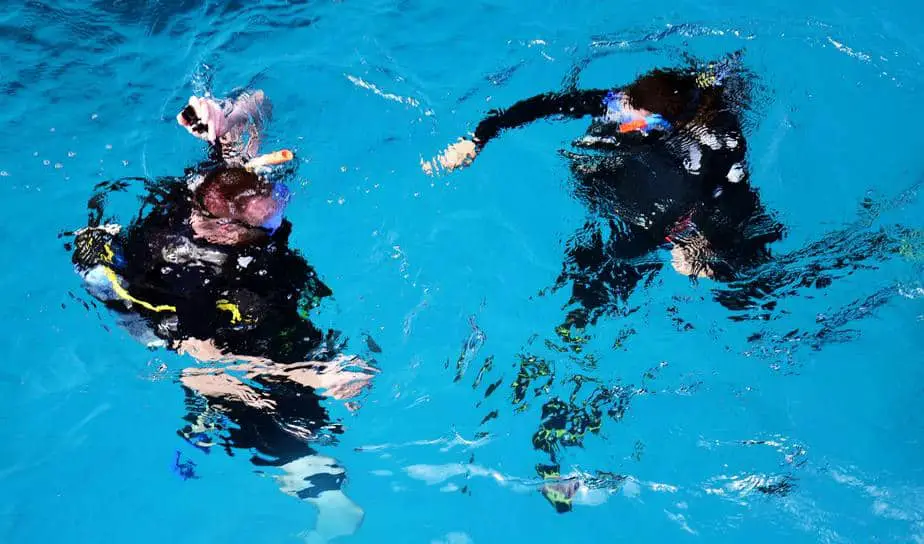
Of course, it’s mandatory for a beginner diver to dive with a buddy. However, what we mean is to sign up for a course with a family member or friend that you want to share the experience with. This doesn’t make the course itself any easier because everyone is graded individually.
However, it may give you some much needed comfort knowing that someone you trust is watching your back during a dive. You can also make some wonderful memories together that you can talk about over a few glasses of beer. Win-win.
Frequently asked questions
Is the scuba diving test hard?
No, the scuba diving test in the theory portion of the course is not hard. If you look at the course prerequisites (PADI Open Water), you’ll get an idea of the level it’s at:
- Minimum 10 years of age or older.
- Time commitment of 8-15 hours.
We want to turn your attention to the first point. That’s right, even 10 year olds can take this course and pass. Of course, what they are actually getting is the Open Water Diver Junior certification. Once they are 15 years of age or older, they can get a full-fledged Open Water Diver certification. If pre-teens and teenagers can pass this test, it’s not that hard.
Furthermore, the time commitment of 8-15 hours encompasses the entire course, including the diving portion. In terms of how much time you’ll actually spend studying, it’s probably half of the time. If you learn things quickly, it will be on the lower end of that estimate. If you take longer to process the information, it’ll be on the higher end. Either way, it’s not a race, so no pressure.
With that said, everybody has their strengths and weaknesses. As we mentioned, the course starts off with diving theory. That means textbooks and lots of readings. You will be quizzed and then you take a final test at the end. Depending on how studious you are, this will either be incredibly easy or somewhat of a challenge.
The final exam of the theory portion is multiple choice and has a pass rate of 75%. Even if you don’t make the cutoff, you can work with your instructor to the areas you’re struggling on and retake the test. Don’t despair if you didn’t pass the test the first time; you can get a second chance.
Is scuba diving dangerous?
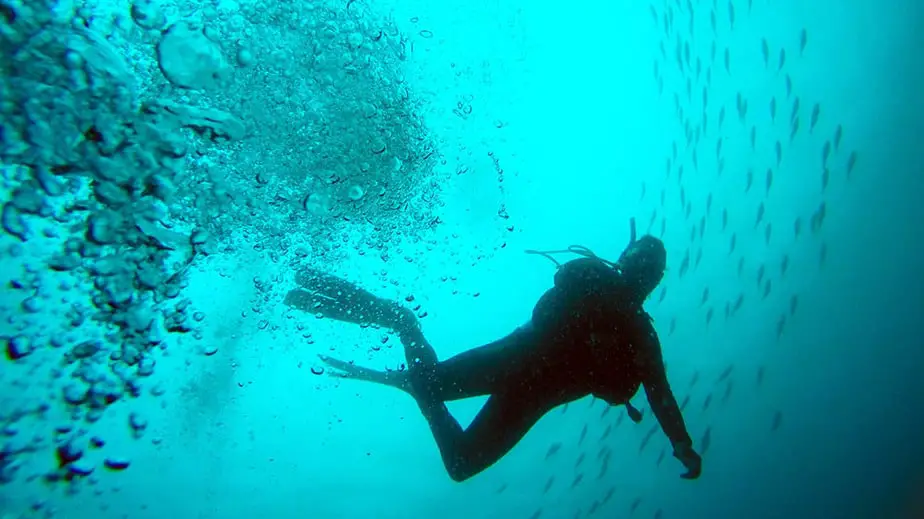
Generally speaking, scuba diving is not dangerous. However, that assumes you are medically fit to dive and follow the proper procedures to ensure you won’t get the bends.
Asking if scuba diving is dangerous is like asking if driving a car is dangerous. If you think about it, you could be in imminent danger while driving all the time, yet it’s considered safe. That’s because there are set rules to follow and precautions you can take to drastically reduce the chances of accidents (e.g. defensive driving, wearing a seatbelt, staying sober, etc).
It’s the same for diving. There’s a reason why scuba diving is often done in groups of 2 to 3 divers. If anything were to go wrong during a dive, your dive buddy will have your back and vice versa. Furthermore, there’s lots of planning that goes into a dive such as determining which day has the optimal weather condition, plotting out entry and exit points, diving with a reliable dive computer and backup air tanks, and so on. There are lots of safety measures you can take to stay safe.
Can I teach myself to scuba dive?
Perhaps you think the whole scuba certification course is too expensive, time-consuming, and difficult. Maybe you’re wondering if you could just teach yourself how to dive by watching YouTube videos or reading guides online (such as the ones written by yours truly) to get all of the diving knowledge you need?
Unfortunately, no matter how well-produced a video is, or how informative an article or forum post is, it is a terrible idea to teach yourself how to scuba dive. You actually need to be taught by a sanctioned scuba training agency to get an officially recognized scuba certification. No dive center, shop, operator, or buddy is going to let you dive without seeing a certification card. There’s too much liability for all involved otherwise.
Furthermore, a diving instructor will give you better instruction than anything you read or watch online because their advice can be custom-tailored to each student’s needs. If you have a question or area that you’re stuck on, you can ask the instructor to clarify the point right then and there. The instructor can give you personal feedback on any mistakes you’re making, or assure you whenever you are doing a good job.
You just can’t receive that same level of care and attention when you’re watching a video or reading guides online. Furthermore, once you get to the hands-on portion where you can actually play around with the gear, having an instructor guiding you through the whole process is much more informative.
Lastly, let’s talk about safety. A scuba instructor will instruct you in a safe environment and will watch your back in case anything goes wrong. Additionally, when you go traveling, travel insurance policies will only cover you if you are a certified diver. Diving without the proper training and certification can lead to (your own) severe injury or even death, so don’t risk it!
If you don’t want to do the full course because you only want to scuba dive once as a bucket list item then there are other opportunities where you can legitimately dive without a license.
Is there an age requirement?
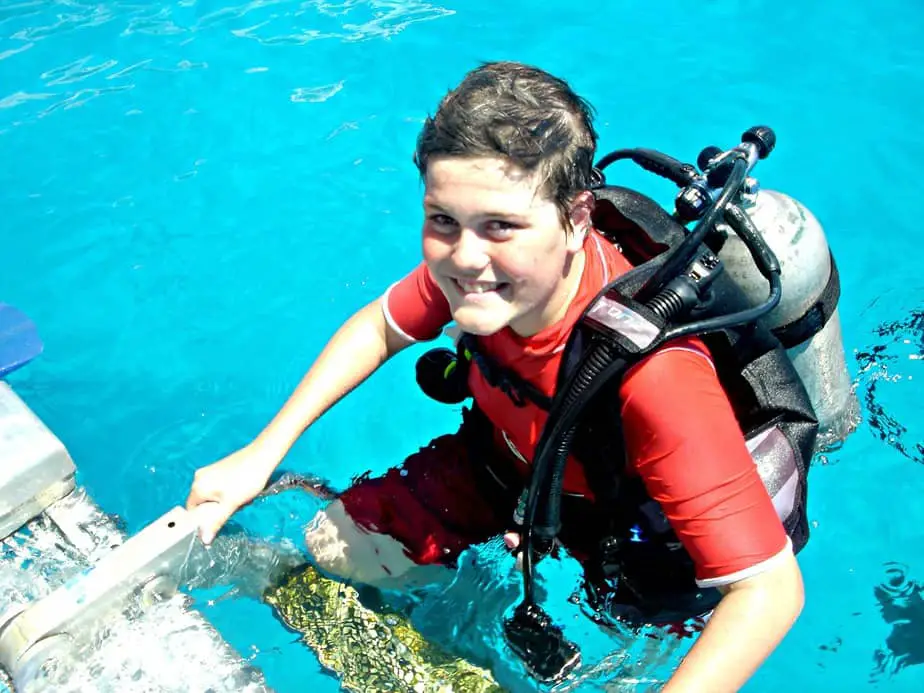
Yes. The minimum age is 10 years of age or older to get a Junior Open Water Diver certification. Here is a full list of PADI scuba diving courses that children can enroll in. The minimum age to receive a full-fledged (no “Junior” prefix) Open Water Diver certification is 15 or older. If you were PADI certified before the age of 15 and want to get a replacement card without the word junior in it, then you can order it from here.
Furthermore, it’s up to the instructor’s discretion whether a child can take the course or not. After all, children are at different stages of growth and that can affect their hand-eye coordination, patience, maturity, and various other factors. A child who is exactly 10 years old may be easily distracted and not yet able to understand the basic physics of diving, whereas another child a few years older might grasp these concepts more easily.
How athletic do I need to be?
People come in all sizes and shapes. One of the benefits of diving is that it doesn’t really matter whether you’re tall, short, thin, or round. As long as you are able to control your movements underwater and have mastery over your buoyancy control device, you should be able to maneuver yourself underwater proficiently.
That said, you do need to be physically fit enough to perform certain maneuvers in order to receive your scuba license. For instance, you need to be able to don and doff your scuba gear both on the surface and underwater. This necessarily requires some coordination and agility.
You do not need to be an olympic level athlete just to scuba dive. Even if you think you might be below average due to age or an injury, such as a leg or back injury, then the instructor may accommodate you by allowing you to enter the water another way. For example, if donning your gear on the surface then jumping into the water is too difficult, you can be asked to don your equipment in the water where the weight is not as noticeable.
Do I have to know how to swim?
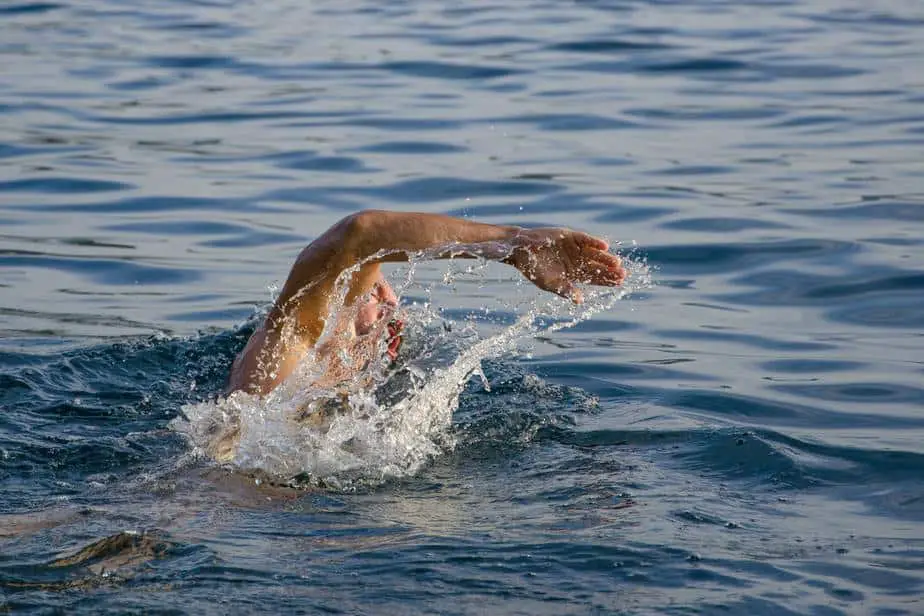
There are half-day courses that let you scuba dive without a license. These courses are intended for curious people who aren’t sure if they want to fully commit to scuba diving and just want a quick hands-on experience. They do not require any swimming experience, and the instructor will literally hold your hand while diving if you need them to.
On the other hand, if you want to become a full-fledged scuba diver with your own official license and all, then yes, there is a swimming requirement. We mentioned earlier about a swim test. The official PADI requirements are that you need to be able to:
- Stay afloat for 10 minutes without a buoyancy aid.
- Swim 200m without any equipment, or 300m with a snorkel, mask, and fins, with no time limit.
Depending on the agency you are training with, the requirements may be different. Generally speaking, if you are comfortable in the water then you can easily meet those requirements. Again, you do not need to be a competitive athlete, and even children and pre-teens can get officially certified.
Is dive theory complicated?
When teaching you the basics of scuba diving, the instructors will not only go over what procedures to do, but will also explain why you need to do it. You will learn the physics and physiology pertinent to scuba diving such as the increasing water pressure as you dive deeper and how it affects your body. At the end of the day though, even if you don’t understand the “why’s” of scuba diving, just follow the guidelines to stay safe.
Even in a half-day course, the instructor will briefly cover the basics of dive theory. In the Open Water course, they will go in-depth about it. A good instructor will go at your pace. Make sure you ask lots of questions if you don’t understand a concept. This helps the instructor gauge your level and adjust the pace so you aren’t overwhelmed. Once again, we have to stress that even 10 year olds have passed this course, so it’s not particularly difficult.
What environmental factors make diving difficult?
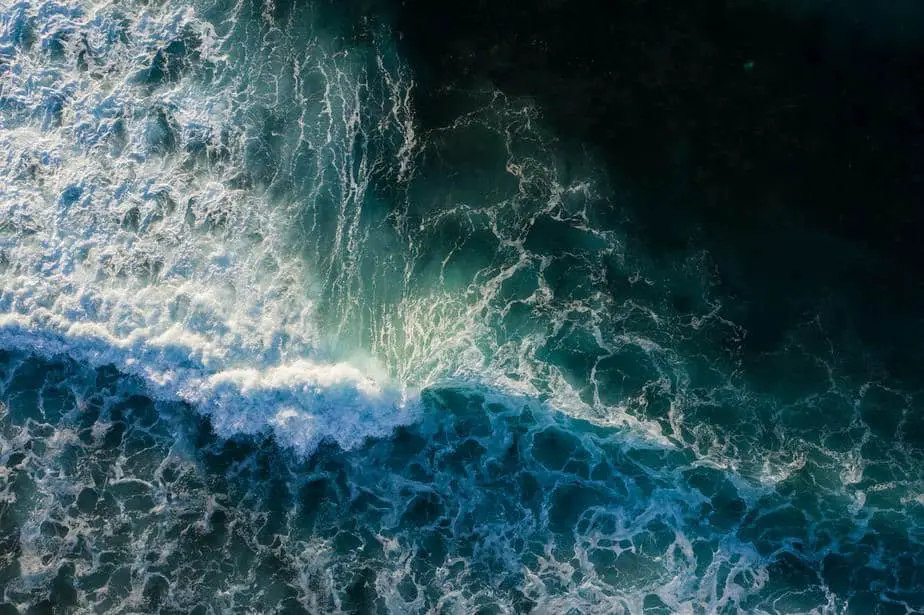
Even after you’ve passed the Open Water Diver course and are now diving independently, there are some factors that can make the experience complicated.
If you just want relaxing and laid-back dives, consider diving in a tropical destination. The pleasant conditions are a major factor in how easy it is to dive. The water is also so warm that you don’t even need to wear a wetsuit; perhaps a thin rashguard is all you need. If you don’t want to travel abroad, there are many great dive sites in Florida, where the weather conditions are idyllic for 10 months of the year.
There is a major difference in diving in a cold climate. Here, the waters are so cold that even a wetsuit isn’t enough to keep you warm. You will need to wear a drysuit instead. Similarly, diving in freshwater is a different experience to saltwater diving. Freshwater is less buoyant due to the reduced salt content. It’s also significantly colder. However, what makes it worth it is that there typically aren’t any currents and the aquatic life you see is different.
Currents are the biggest issue. If there are strong currents, going out becomes much riskier. Waves can rock the boat and cause you to get seasick. It can also make it harder for a boat to spot you once you surface. Being tossed around by waves on the surface is also very disorienting.
Ideally, you will scuba dive on a day where currents are minimal. Swimming peacefully at your own pace is obviously much easier and more enjoyable than frantically swimming for your life against strong currents. If you have to expend energy to fight against the current, it will not only exhaust you but the increase in gas consumption will end your dive much faster than expected.
Before heading into the water, we recommend surveying the dive site first. You can also ask dive shop employees and locals if they have any advice they can give you about the weather conditions that day. If you’re not sure you can handle the rough environmental factors, consider diving on a different day.

